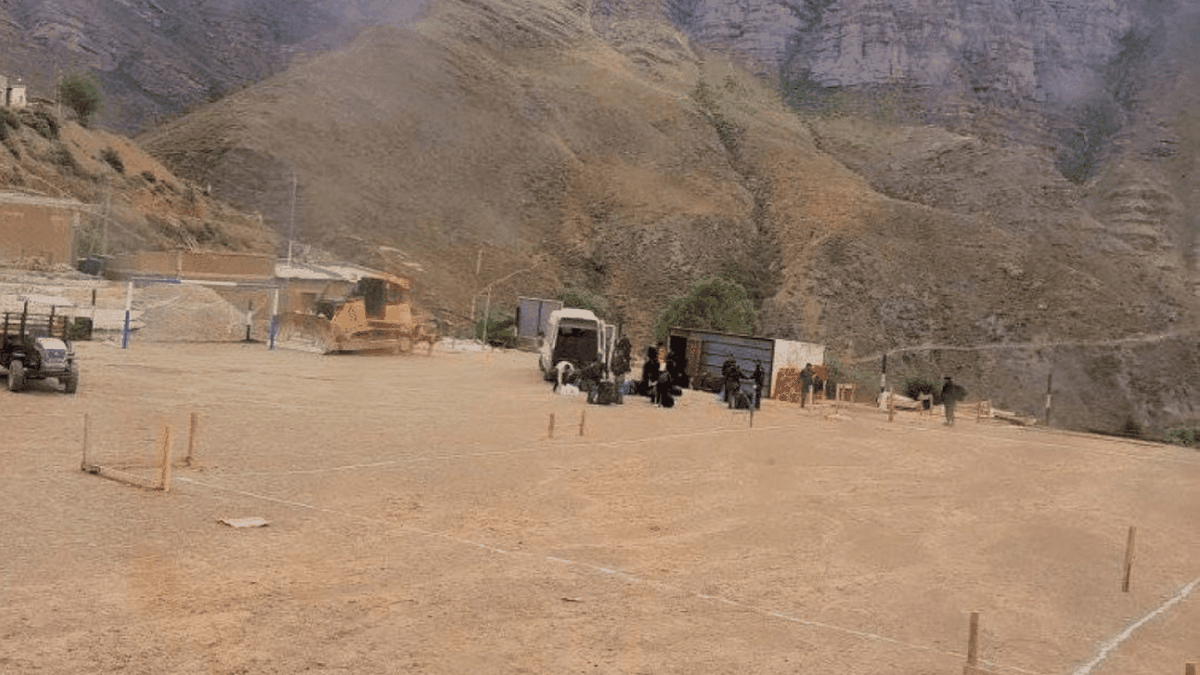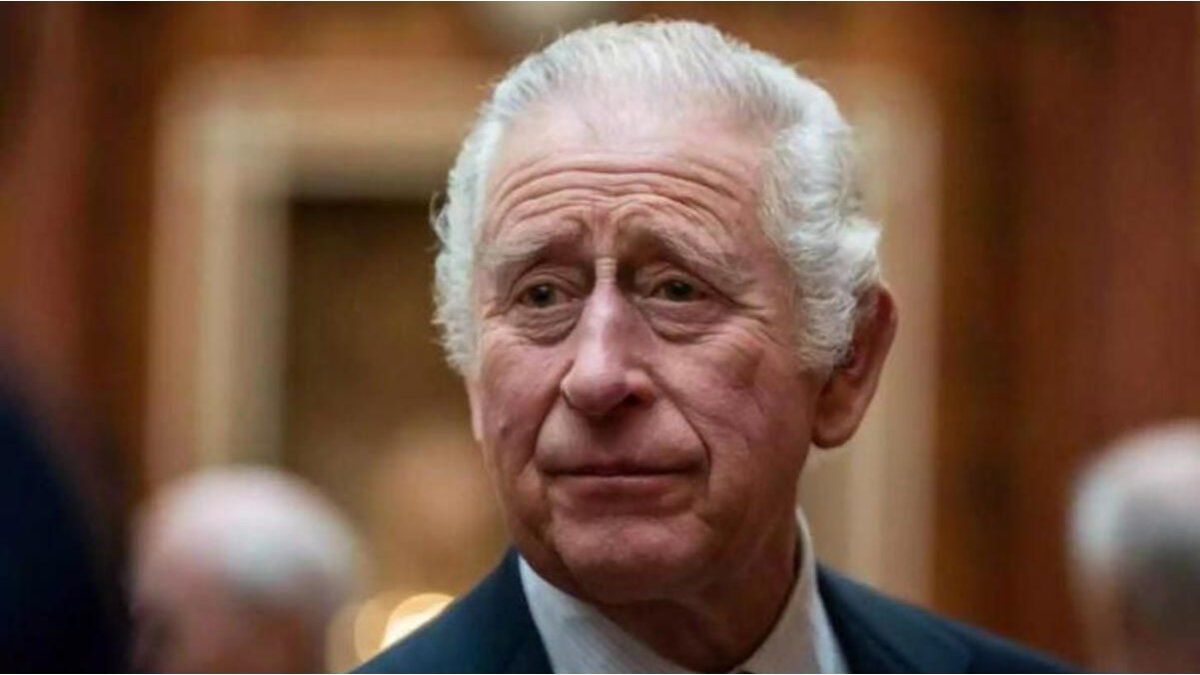The Government of Jujuy must return a property that it took and repair the damage it caused to another, which belongs to the inhabitants of the town of Caspalálocated 3,100 meters above sea level, for advancing the rights of a community to preserve their ancestral customs. The unprecedented measure of the Federal Justice is the result of an agreement reached by the Public Prosecutor’s Office (MPF) and the provincial State Prosecutor’s Office, to end the state of “state of social commotion” that began on November 18 in 2022 , according to the court decision.
The judicial dispute began two years ago when the Jujuy government broke into a property that was used as a soccer field and for social gatherings, with the aim of building a secondary school. Faced with the reaction of the families to avoid it (they had proposed an alternative place and were not opposed to having the establishment), there was police repression and arrests, with a wide public impact because it was a town of 400 inhabitants that was recognized in 2021. for the World Tourism Organization as one of the “best destinations in the world”, for its tranquility, rural and community lifestyle. In an attempt to neutralize the negative effect of the measure on public opinion, at a time when the governor was the radical Gerardo Morales, then a pre-candidate for president of the Nation, the leveling of the land and construction were stopped.
Embed – https://publish.twitter.com/oembed?url=https://x.com/UNWTO/status/1468271589867274245&partner=&hide_thread=false
#BestTourismVillages by UNWTO Caspalá, Argentina.
The Conservatorio de Saberes y Haces brings together young people and transfers research techniques to document the stories and traditions of the village linked to production, environmental conservation and heritage. pic.twitter.com/lvTr1QwErA
— UN Tourism (@UNWTO) December 7, 2021
However, according to the federal prosecutor Lucia Romina Orsetti, On November 30, the provincial State moved forward, for the second time – again without consultation or an environmental impact study – with machinery on a private property, of high archaeological value, to move the claimed playing field there, as compensation. It was in the same area, on the Santa Rosa farm, owned by the neighbor. Pablo Cruzwho was admitted to a hospital in the capital of Jujuy. His partner and children could not avoid the advance of a backhoe and a caterpillar machine, since the government had made the decision to build a soccer field there that it had occupied for the construction of the school, a few days before. In an attempt to legalize this appropriation, it was found that the provincial State expropriated the land through a law approved in record time, when the conflict with the Caspaleño community was already raised.
Since then, legal action began in the provincial courts and continued in the Federal sphere because the planned school had financing from the national State, among other reasons. “Since those days, and due to the conditions promoted by the State, the field remained unused and prevented its residents from using it not only for sports activities, but as a center of life, in the terms of the greatest daily and habitual nature possible in a community with its cultural square,” the prosecutor explained in the case when referring to the damage caused. Until now, the movement of the ground carried out by the machines of the company awarded the work persists, there are the beams that were built and there are all kinds of materials in the ancestral property.
Irreparable damage
Prosecutor Orsetti argued that, in the second area, the aggravating factor was not the destruction of a mere landscape, but the irreparable damage that was done to pre-Hispanic underground slab structures, which were associated by expert experts with the territorial expansion of the Inca empire. between the years 1,000 to 1,400. And he recalled that the work was suspended due to new demands from the residents, who came out in defense of the land, where the family took care of maintaining its conditions. His grandparents recognized the area as “the resting place of the ancestral souls of the town.” According to the anthropologist Gustavo Ontiveroson Cruz’s property the machines “destroyed part of four or five underground structures that could be tombs or circular silos.” “In addition, ancient archaeological platform structures, some pre-Hispanic, were destroyed,” he added.
Shortly after beginning the journey in Courts, only in June 2023, a precautionary measure paralyzed the works, which generated a series of challenges by the provincial State, but the proposals were addressed and rejected by the Federal Court of Appeals of Saltaaccording to documentation to which Ámbito had access. According Silvina Llaneslawyer for the residents, the land “belongs to the Kolla Pueblo aboriginal community of Caspalá, it is private property, not the provincial State, and there is documentation that proves this.”
An unprecedented agreement
Faced with the volume of evidence that compromised the State of Jujuy for, among other reasons, not having carried out a consultation process with the native community, established in current legislation, prosecutor Orsetti made progress in solving the conflict through an alternative solution directed to “reestablish social peace”, which had as its objective the comprehensive reparation of the affected residents, provided for in article 22 of the Federal Criminal Procedure Code.
On November 13, the hearing was held in which the Public Prosecutor’s Office and the provincial state prosecutor, Miguel Angel Rivasagreed to put an end to the dispute that existed between the residents of Caspalá and the provincial government due to the state invasion in November 2022. The federal judge of Guarantees No. 2 of San Salvador de Jujuy, Carina Inés Gregoraschukapproved the agreement, who considered it unprecedented due to the characteristics of the object of the process that caused a social conflict of great magnitude. As agreed, the Jujuy government committed to reestablish the pre-existing conditions at the beginning of the conflict, both on the soccer field and on the private property, within a period of 30 business days. It was clarified that this result does not extinguish the criminal actions for the damages caused, against the state officials who participated in the entire process, from former governor Morales and ministry officials, to the municipal commissioner at the time.
At the public hearing, before the signing of the agreement, Judge Gregoraschuk gave all parties the opportunity to say a few words. The prosecutor highlighted the understanding as an action aimed at “reversing damages that concern the cultural and archaeological heritage of the Kolla community of Caspalá.” And he added that only when the agreement is finalized “would the criminal action be terminated with respect to the two events described. Failure to do so will leave the prosecution of all criminal actions arising from such events remaining for this federal prosecutor’s office.”
Lawyer Llanes described the agreement as a “vindication of subjugated rights.” “This is a respite from the horror that was experienced and which was achieved thanks to a great effort by the federal justice system, especially by the prosecutor’s office for the enormous investigation carried out,” he assured.
Representatives of the community also participated in the hearing, who highlighted that it was not just about a field, but about what it represents for them and for future generations. “We were afraid, but now we feel that we have been heard, which makes us very happy,” said Justa Balcarce.. “They hit us with rubber bullets and tear gas, they had no compassion for the women, the children or even our grandparents who had to run from one side to the other, crying,” one of the residents remarked, remembering how traumatic it was. It was for the small community to confront scenes of institutional violence.
Ámbito consulted Lidia Balcarcefrom the town of Caspalá, about whether they have so far received any notification or observed any action by the provincial State to comply with what was resolved. “So far they haven’t notified us of anything,” was his response. In the tourist town, it is expected that the conditions in which the court was, the ancestral site, will be restored to be used again as a ceremonial and sports space, for cultural and traditional activities, including the patron saint festivities and, in January , the land of animals.
In contact with this medium, lawyer Llanes explained that the government is expected to comply with what was agreed and that the law of expropriation of the Cruz family’s land will be repealed. He warned that “the criminal case continues for infringement, theft and destruction of archaeological heritage, a case in which provincial officials were reported and which began in the Courts of Comodoro Pyin the Federal Capital, which also includes Gerardo Moralesfor usurpation, theft, abuse of authority and failure to fulfill the duties of a public official.” He explained that the hearings began to present evidence and formalize the accusations against a dozen officials.
When the lawyer was consulted about why the complaint was filed in Buenos Aires, she maintained that “those that were presented in the provincial courts never advanced, in a context in which Morales concentrated great power.” “The option for Federal Justice avoided that interference that, although it existed, could not stop the progress of the case. The process was expedited when the former governor lost political power, he was not a candidate for anything and strong evidence accumulated against the provincial State,” he added. Llanes emphasized that the agreement is of high value because the provincial State recognized the existence of the crimes and opened the door to new lines of investigation. He gave as an example the question about where the funds that the Nation allocated for the construction of the secondary school are. “We know that they moved to Jujuy but no one knows what was done with them because if we wanted to move forward with the construction of a new establishment, in another place, the funds are not there,” he stated.
Embed – https://publish.twitter.com/oembed?url=https://x.com/DescubriTurismo/status/1495891602065301510&partner=&hide_thread=false
a paradise
Caspala It is located in the department of Valle Grande, 10 kilometers west of Santa Ana and 240 kilometers from San Salvador de Jujuy. It is 3100 meters above sea level and the town is in the middle of a mountain range. From San Salvador de Jujuy you access Caspalá via provincial route 73 and before reaching the town you travel two snail-shaped slopes.
Main attractions:
Santa Rosa de Lima Church, a chapel built in the 1840s.
The Old Town, an archaeological site of great value to know.
Qhapaq Ñam, Inca Trail, 10 kilometers from Caspalá.
The El Antiguito viewpoint, which presents views and ancient constructions of mud and stones.
Casa Mocha Waterfall.
Source: Ambito
I am an author and journalist who has worked in the entertainment industry for over a decade. I currently work as a news editor at a major news website, and my focus is on covering the latest trends in entertainment. I also write occasional pieces for other outlets, and have authored two books about the entertainment industry.




